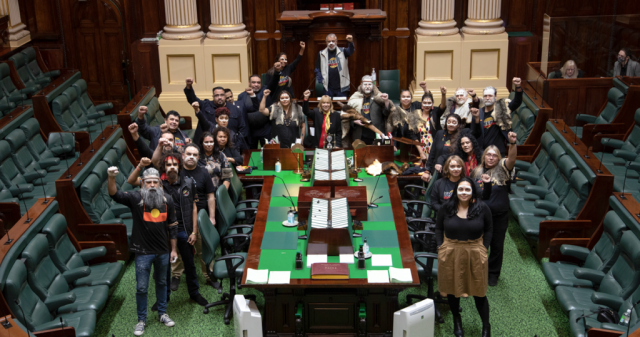
By Mikayla van Loon
An historic moment occurred in the Victorian Parliament last week with ministers voting to appoint an independent Indigenious umpire as part of Victoria’s journey towards Treaty.
The First Peoples’ Assembly of Victoria was handed the landmark decision on Tuesday 16 August, the first big success in the process to gaining a voice on matters affecting Traditional Owners in parliament.
Wurundjeri Woi Wurrung representative in the Assembly, Uncle Andrew Gardiner said, the independent authority will negotiate any disputes throughout the Treaty process between First Nations people and the government.
“It’s a jointly agreed process and if there are any disputes in the future, then they can be resolved, the process can be used and respected using our traditional lore of the land and common law, using our cultural authority, that is then at the heart of the journey towards Treaty,” he said.
“If issues can be resolved, then the discussions and the deliberations and the agreements about individual Traditional Owner groups’ Treaty aspirations can be confirmed.”
Not expecting a decision on this Bill so quickly, Uncle Andrew said the Assembly first visited Parliament House on 22 June to discuss the implementation of a Treaty Authority.
“We spoke to many politicians to make sure that we were getting the support that was needed for the bill to go through to the Upper House.
“So for the Upper House to pass it so effectively, because we were expecting it to be a September thing, but for it to be passed now, says that all the hard work that’s been done is actually paying off and the politicians and their constituents hopefully, support the Treaty Authority.”
By taking this step forward, Uncle Andrew said Traditional Owners can begin identifying what they would like to see in their communities for the future, not just in one generation’s time but in four or five generations.
“The actual negotiating, which is about getting a community agreement about what those parts of their Treaty are.
“We talk to communities about possible land hand backs, economic development, support, educational opportunities, employment opportunities, it should be how people can get employed and trained and skilled up to be employed in the broader enterprise.
“There’s lots and lots and lots and lots of opportunities that various communities will pick up in their own backyard that will be quite specific, but then there’ll be some very general things that most communities will be saying.”
While just the first step, Uncle Andrew said other states and territories are watching how Victoria is approaching the Treaty and has the ability to influence the call of a referendum to change Aboriginal constitutional rights Australia wide.
The next item to be passed by the government is the Treaty Negotiating Framework, as well as the Self Determination Fund.
Coming into the State election in November, Uncle Andrew would like to see more Aboriginal people signing up to vote to have their voice heard but also from the broader community to share their support of the Treaty process and of local Traditional Owner groups.
Treaty, although unable to change the past, Uncle Andrew said can change the future of many young people still suffering the generational trauma of points in Australia’s history like the stolen generation.
“There are greater numbers of Aboriginal people who have been left behind, the stolen generation, for example.
“You can’t just click your fingers and expect people who’ve been traumatised for several generations that have been disadvantaged in the past by the government to suddenly go ‘it’s ok’.”
Instead the Treaty will work towards ensuring First Nations people receive the support they need, whether that be through counselling or education, so “we can actually take part in the Australian experience.”
“This Treaty now gives great opportunities to have a formal negotiation, a formal discussion about what our rights are, what our rights are now, what we seek to do in the future, and how the government and the rest of society can actually enable us to do that so we can be part of the general community as well.”






